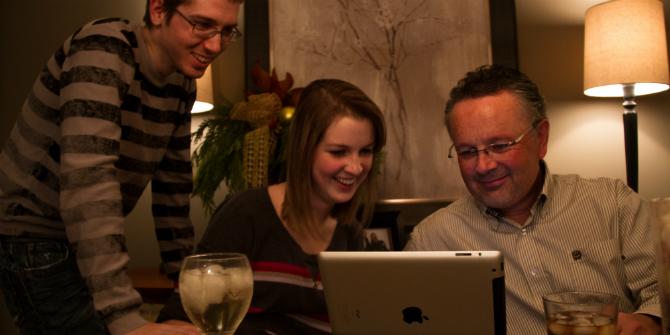Our reliance on internet technologies increased as the COVID-19 pandemic progressed and with it concerns from parents, teachers, and governments that our digitally-mediated lives might have detrimental effects on children’s mental health and wellbeing. In a contribution for Common Sense’s report Tweens, Teens, Tech, and Mental Health, Sonia Livingstone explains why we need to move beyond the screen time debate and start paying more attention to differences in online experiences. Parental hopes and fears about technology shape their children’s lives, as we read in Sonia’s new book, highlighting the need to support parents in ways that respect their diverse circumstances, build competence, and inspire new possibilities.
We’ve got so much information now, about screen time is bad, or just stuff pumped at us; you sort of feel guilty if you let them have … yes, if you let them have too much.
Can we “flip the script” from counting hours of screen time to distinguishing different types of online experiences? This is a pressing issue for the middle-class mother quoted above (and many parents we interviewed for our book Parenting for a Digital Future: How Hopes and Fears About Technology Shape Children’s Lives). Melissa worries that screens “can take away their childhoods.” But she also recognizes that her children are “growing up in a technological world” and wants them to be prepared. As a blogger, Melissa has some technological skills and creativity to share with her children, but screen time rules get in the way.
In Britain, as elsewhere, the rules on screen time set by the American Academy of Pediatrics are well known, but parents rarely know what those rules are based on or that the evidence is contested by experts. Leila, a single parent living on a low income, told us “in the news I heard … no more than two hours.” The rules seemed to her authoritative, absolute. Yet technology plays a crucial part in her life. Having migrated from Ethiopia, she loves to stream religious music from her home country to share with her daughters. She spent a lot on a computer to support their schoolwork, saying, “The bill is too much but you need it, you know, technology is growing.”
For today’s parents, counting the hours of screen time seems to miss the point. They need to prepare their children for a digital future, and they want their children to be digitally skilled and to make good judgments about what they do online. Parents themselves may be digitally skilled, even enthusiastic, about the digital world and want to pass this on to their children. We interviewed some families excited about the digital future, and who is to say this won’t stand their children in good stead?
Others were struggling with challenges around money, health, work, family, or disability, and found technologies offer a way around their difficulties or an opportunity to relax with their children. Leila, for instance, is already stressed out and sad about working so hard away from her children. Why compound her anxieties by making her feel guilty? Being told to “police” or “ban” their children’s activities adds to family stress and undermines trust. In our survey of U.K. parents, a quarter said that screen time rules led to family conflict. Yet only around one in 10 clashed over what children actually do online. Parents would prefer to involve their children in making good decisions together, but they really want guidance.
As Melissa said of the internet, “We’re all terrified about it for our own children because it seems something we can’t stop, yet has so much … I think it’s not very good for your mental health.” But like other parents, she doesn’t know where to turn for advice about what content can be good for her children (and why), and what content is not. Stuck between trying to prepare their children for a digital future and obey rules that don’t fit the purpose, parents need support that respects their diverse circumstances, builds confidence and competence, and inspires new possibilities.
Notes
This text was originally published on the Common Sense Media blog and has been re-posted with permission.
This post gives the views of the authors and does not represent the position of the LSE Parenting for a Digital Future blog, nor of the London School of Economics and Political Science.
Featured image: photo by Victoria Borodinova on Pixabay






